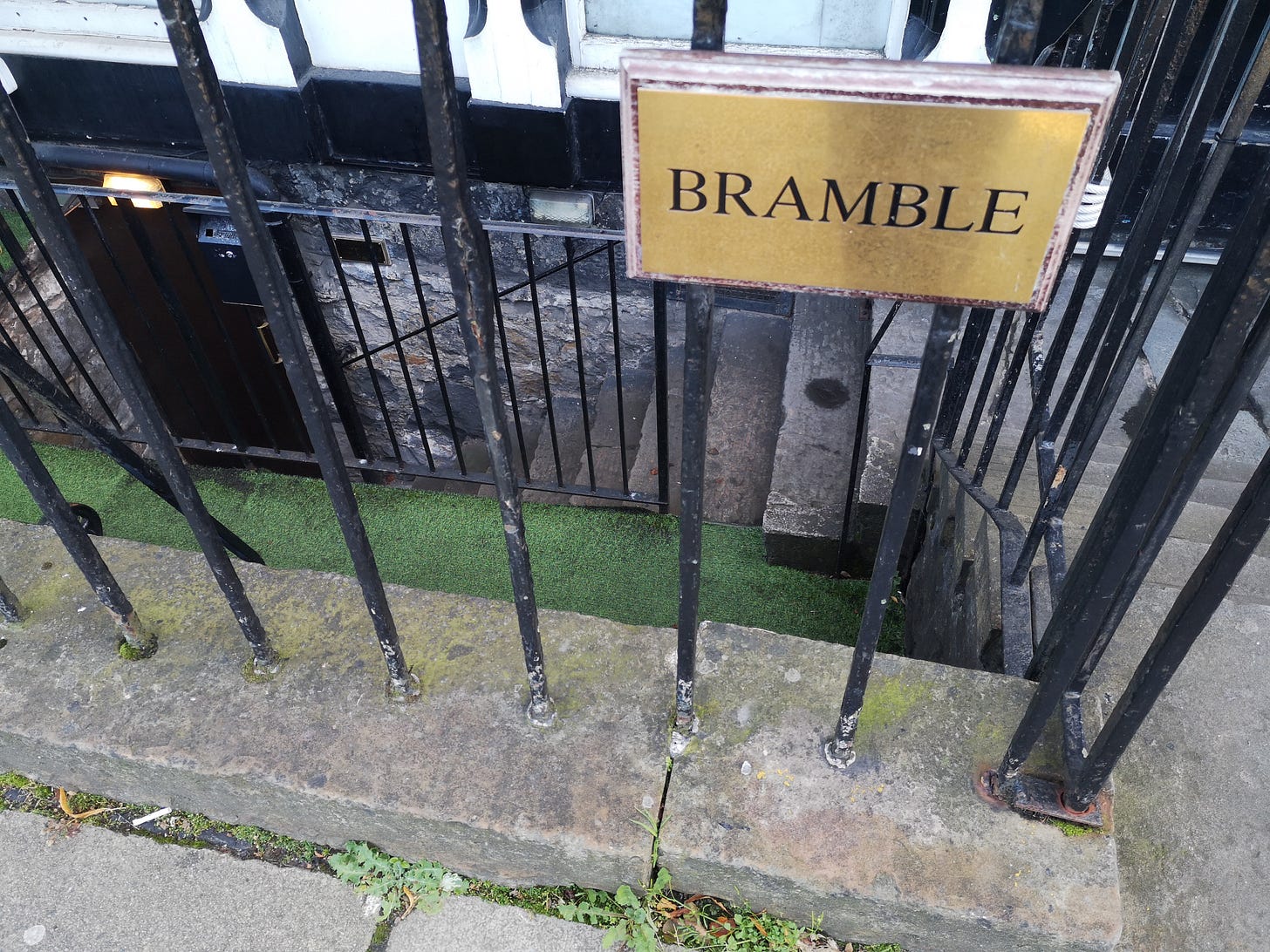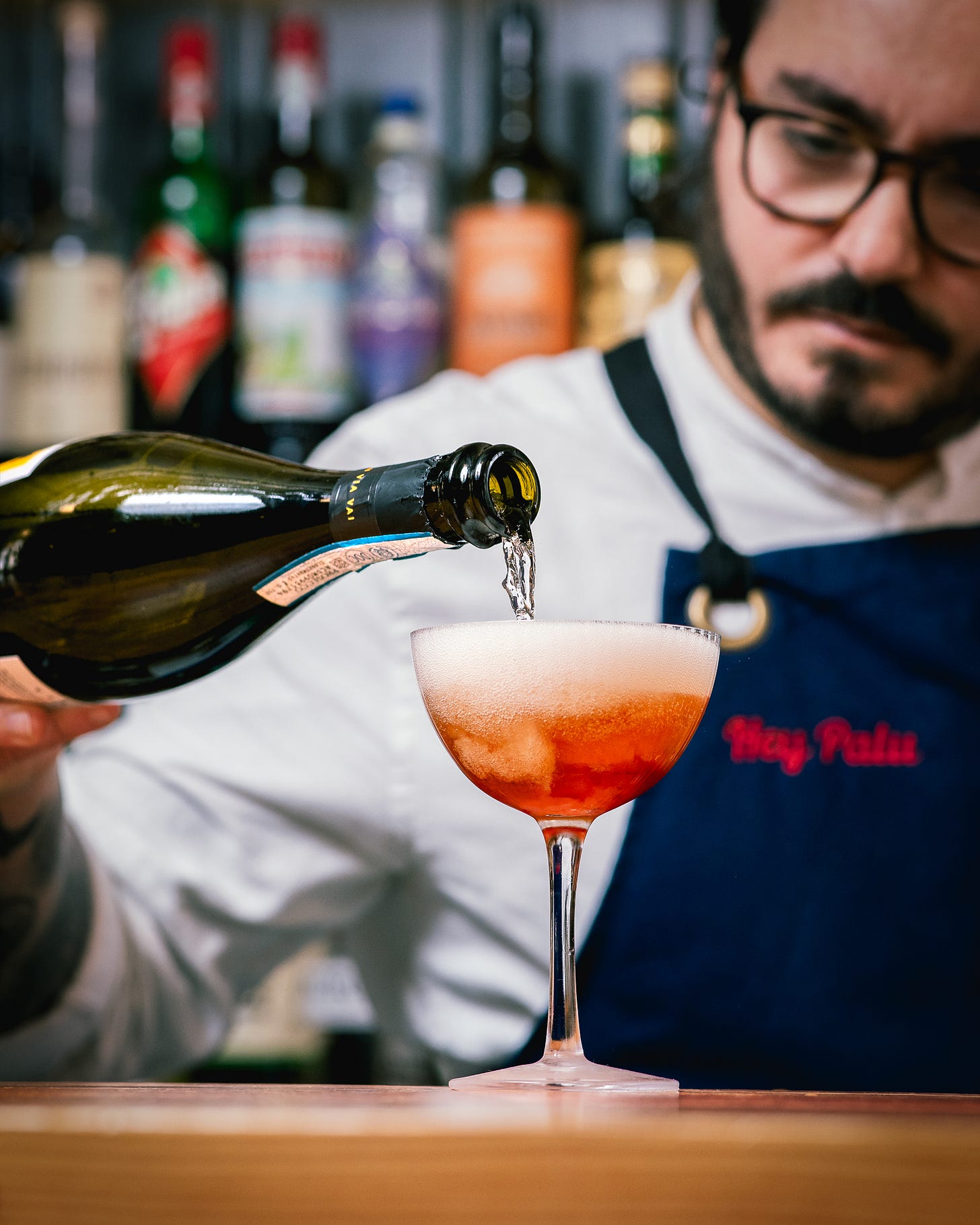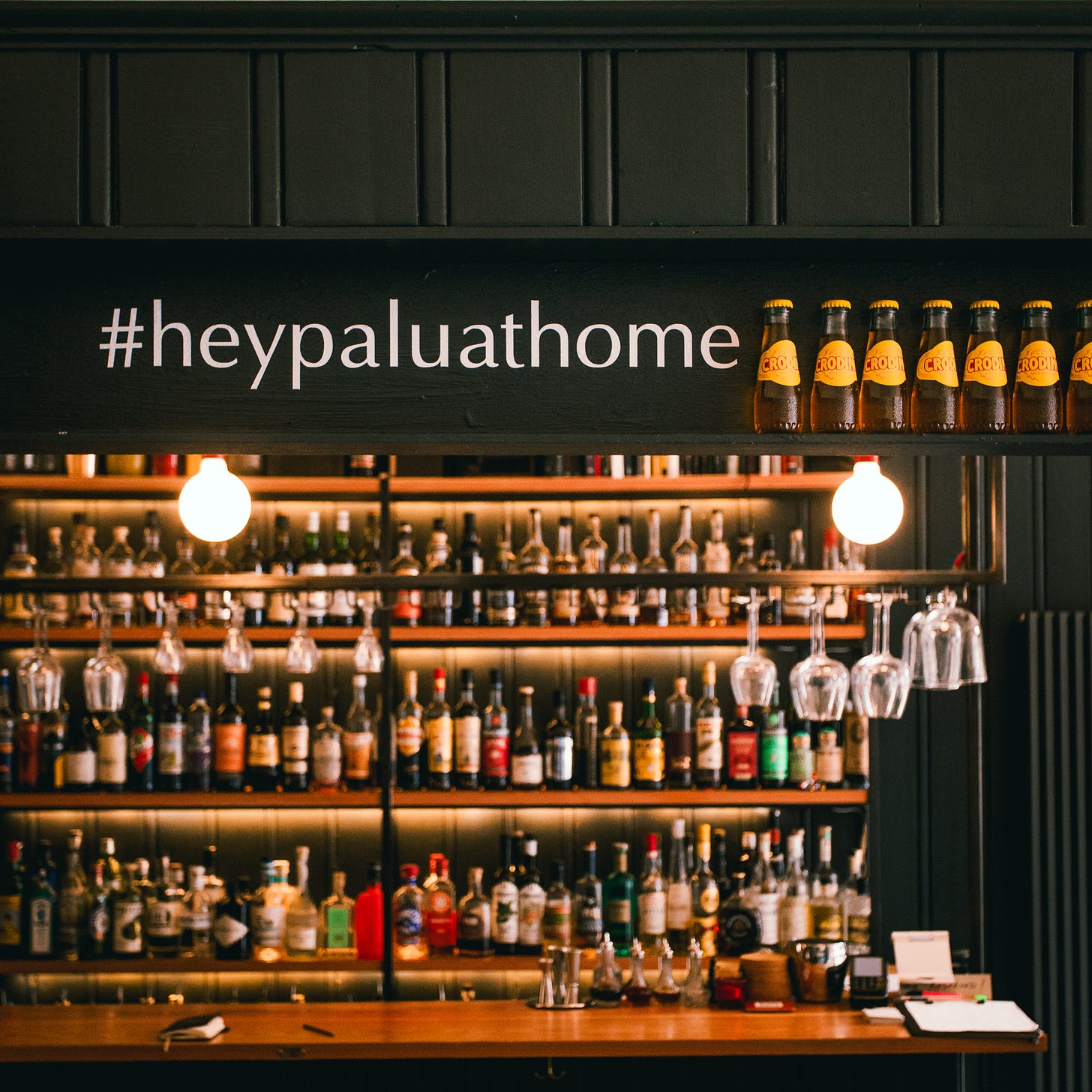Anyone for a Shirley Temple or Roy Rogers?
In search of the secret - and surprising - ingredients that make Edinburgh the UK’s second cocktail Capital
The accidental collision between Sober October and the single biggest celebration of cocktails in Britain might seem like unfortunate timing. Far from it.
“Mocktails are a really big thing for us,” explains Gary Anderson, the brains behind the wildly successful Edinburgh Cocktail Week. “So many people are opting not to drink alcohol, but still want to come and get that experience, enjoy the live music and the buzz of the festival.
“This year we've been doing a really big push on non-alcoholic versions. We strongly recommend that every bar that takes part offers them and I would say that 80% of them do.”
Alcohol-free is this year’s drinks industry hot trend. Fueled in part by the experiences of lockdown and a growing awareness of looking after our own physical and mental wellbeing, choosing to opt out of alcohol for a night, a month or altogether is increasingly popular.
There is a generational switch at work too with under-25 far more likely to take the booze-free path.
It is something that Sam Baxendale, general manager at the acclaimed Bramble Bar in Queen Street, sees on a nightly basis.
“We've got to make sure we've got a selection of replacement liquids so when we're making drinks for these guests they are of the same level and quality that you’d expect as an alcoholic cocktail. It also gives us a nice challenge because they are a relatively new drink development,” he says.
Although cocktails without booze are nothing new, with drinks like a Roy Rogers, a Shirley Temple and a Virgin Mary dating back to the earliest days of cocktail making around the 1930s, the city’s mixologists are regularly experimenting and innovating to create new tastes.
“There are so many great non-alcoholic offerings out there,” enthuses Iain McPherson, co-owner of the award-winning Panda & Sons, further along Queen Street, adding: “I totally respect the no-alcohol movement.”
A Shirley Temple, for the uninitiated, is traditionally a ginger ale with a splash of grenadine and a maraschino cherry. Named because you could serve them to someone as young as the famous child star, Temple apparently hated them: “That saccharine sweet, icky drink!”
Britain’s second cocktail Capital
For a city of its size, Edinburgh punches above its weight when it comes to mixology. As proved by three Edinburgh cocktail bars - Panda & Sons, Bramble and Hey Palu, in Bread Street, recently ranked in the UK’s top 30 cocktail bars, more than in any other region except London.
So what makes sipping a Mojito or negroni so popular in the capital? There are a few ingredients: the Edinburgh Festivals, the number of international visitors and students, events like Christmas and Hogmanay, and the historical affluence of the city.
Sam Baxendale explains: “Historically Edinburgh has always been the city for cocktails with the high consistency and the best quality of hospitality in Scotland and more people willing to spend money.”
He points out that in previous years, before the pandemic, there were seven Edinburgh establishments on the top 50 UK list.
It’s an underground scene
There is something glamorous about the nocturnal underworld of cocktail bars. You can easily walk past Bramble Bar, hidden below the City Alterations store on the corner of Hanover Street and Queen Street. A small brass plaque is all that is visible from street level.
“Our day-to-day guests are a whole cross-section of the Edinburgh population. We don't really have an ideal guest, except those who want to have a good time and enjoy drinking good things - but aren't afraid to try something different,” he says. “We have a collection of wonderful regulars and you'll often find hospitality staff from other venues here. We also have quite a few global regulars from further afield propping up the bar.
“Like a lot of industries post-Covid, we've suffered from a loss of skills and staffing. We're still recovering from that and catching up, but in Edinburgh at the minute I’ve definitely got the sense that hospitality has returned.”
Bramble’s most popular beverage is their namesake cocktail, and, at £9, it is also their cheapest. It is, as all cocktail connoisseurs know, made with gin, lemon and sugar and blackberry liqueur or crème de menthe. Other favourites include ‘Get Steppin’, made with mezcal, and the gin-based ‘Evergreen’.
Panda & Sons, the highest ranked Edinburgh bar on this year’s industry top 50 list, at number six, appears to be a vintage barber shop from the outside. Head downstairs and you enter the bar via a secret bookcase entrance to an elegant dimly lit bar.
Opened in 2013, its moniker was inspired by McPherson’s nickname, ‘Panda’, with the ‘& Sons’ part a nod to his family’s grocery store in Pitlochry, McPherson & Sons, which operated for 100 years. The Gordonstoun-educated bartender is in high demand across the world for his mixology knowledge and skills. He co-owns his bars with Sam Chapman, a friend from university. These include Nauticus, in Duke Street, Leith, with Kyle Jamieson, which showcases primarily Scottish drinks, and Hoot the Redeemer, which is a funfair-inspired dive bar that sells alcoholic ice creams, in Hanover Street.
London, New York… Edinburgh
The cocktail scene has grown significantly in Edinburgh over the last decade or two.
Bramble Bar, number 13 on the UK list, was set up by Mike Aikman and Jas Scott in 2006, and is now part of Mothership Scotland, which owns Last Word, in St Stephen Street, Stockbridge, and Lucky Liquor Co, another Queen Street bar.
The owners are both bartenders who wanted to create a bar they’d like to visit themselves and are major figures in Edinburgh’s modern cocktail scene. The name of course comes from the celebrated drink created by the late, legendary London bartender Dick Bradsell, who also invented the Espresso Martini. Scott has himself created several groundbreaking drinks, including the ‘Mint 500’. Although it doesn’t feature on the current menu, the bartenders still get asked for it. “It is a really refreshing, summery drink made from gin, basil, apple, vanilla, peach and a lot of elderflower,” explains Baxendale.
Another big figure in the city’s cocktail culture is Stuart McCluskey, the original owner of Bon Vivant, in Thistle Street, who is coincidentally a childhood friend of Bramble’s co-owner Aikman.
McPherson, who also flags the importance of bars like Dragonfly, in West Port, George IV Bridge’s Villager, and Voodoo Rooms, tucked above the Cafe Royal, in West Register Street, adds: “Outside of London and New York, Edinburgh was actually one of the first cities to grasp the whole cocktail movement.”
Over his international 20-year career, Alex Palumbo always dreamed of his own bar, and contemplated cities such as Manchester, and Bristol but purposely opted for Edinburgh. He moved and initially worked for the Compass Group, which he says, “Gave me the insights of what I needed to know to open my own business here.”
If you fancy a wild strawberry negroni, or a glass of Amara liqueurs, then Hey Palu, a modern Italian bar on Bread Street is the place to go. It is owned by Palumbo and his wife, Rachel who opened four years ago. Palumbo grew up in Amalfi, Italy, but moved to London and says, “I fell in love with hospitality, it captured my imagination and I was lucky to be working in London at the moment when there was this new renaissance of cocktail culture.”
His bar placed at number 27 on the UK list, and also scooped the award for Bar Team of the Year. “It was a complete surprise to win. It was funny because the letter arrived in the post, and there was nobody else in the bar at the time, just me so I had no one to celebrate with.”
‘You can write your own cheque’
The growth of the scene means becoming a mixologist has become a viable career in Edinburgh rather than just a stop-gap job.
Baxendale might have been an architect after studying the subject at the University of Edinburgh, but after completing his studies he decided to switch to hospitality. Similarly, McPherson honed his drink-making working at Voodoo Rooms for six years, after studying marketing at Heriot-Watt.
“A lot of people start off with a student part-time job, and you develop a passion for it,” says Baxendale. “Maybe you’re interested in the actual cocktails and the mixology, or maybe you really like being able to tell stories through what you create as a drink, or you really enjoy the team that you work with.”
But as a globally award-winning bartender working on the world stage, working with drink brands, training and consulting, Baxendale explains, ”you can practically write your own cheque, I know some people who can charge £6,000 a day.”
The traditional progression is to start at the bottom as a barback (or assistant bartender), before progressing to bartender, head bartender, bar manager, and then senior management. A starting salary for a bartender in Edinburgh is around £24,000 a year rising to £35,000 and you can earn up to £50,000 as a bar manager.
Baxendale began working at Bramble in 2013 but left in 2016 to open his own cocktail bar, Kin which closed in 2020. He explains Covid has seen the next generation of budding mixologists miss out on two years of training, he says, ”Being able to make a good drink is not enough to succeed. You need a range of skills, and to learn the history, from the birth of cocktails as well as understand more modern scientific theories of flavour and human behaviour.”
Hangover of the pandemic
“Covid has had a huge effect on hospitality, especially in the bar scene,” reflects Baxendale. “Before the pandemic there used to be a lot more people quite happily standing in a bar. I remember the public outcry when the Scottish Government ordered everyone to be seated. We'd never taken reservations before. Now I chuckle because some people won't come in if they can't get a seat.”
Bramble used to be open seven days a week, pre-Covid, but now it is open Tuesday through Sunday with Wednesdays often as busy as the weekend. “Home workers are often called into the office for mid-week meetings, and while they are in town they often go out for drinks with friends and have that big sort of night.”
As a result of the pandemic, Panda & Sons now close on Mondays. McPherson adds: “Tuesdays are really busy, and Thursday is super busy because of the four-day working week. The whole office thing has really changed a lot, Fridays are busy but it is not like it was back in the day.”
The pandemic was tough for him and many of those he worked with. “I developed a business called Edinburgh Booze Delivery and wanted to help the bar community because not every bar had an off-licence capability. We would distribute for them. That was something I was really proud of.”
Hey Palu also had an existing off-licence in place so were able to sell cocktails-to-go and collaborated with restaurants. They also made aperitif hampers which companies bought instead of holding office parties. Palumbo explains, “In the beginning, nobody knew how long we would be closed, we thought maybe two or three weeks. It was tough but if you work for yourself, you are able to make decisions much quicker. It took so long for us to decide to set up our own bar. We fought hard because we couldn't just let it go.”
As a result of the pandemic, he says: “People's buying patterns have changed, ordering drinks with a QR code is normal and gone are office workers going out after work on Fridays.”
He acknowledges that the pandemic helped their bar become more known to Edinburgh’s drinkers. They have since converted online customers into local regulars, Palumbo says: “It is good to meet them in person, we have name tags on the bar to say thanks for all their support, a bit like bars in the old days when they used to have engraved tankards, we want to do something similar but more modern.”
Cutting-edge of cocktails
Edinburgh is at the forefront of the drinks technology as a result of cutting-edge research being carried out by moustachioed mixology maverick Iain McPherson. He was recently named number 10 in Drinks International's list of the 100 most influential people in the bar world. McPherson along with Nicky Craig has spent years inventing four new game-changing processes to intensify and combine flavours called; switching, sous-pression, freeze drying, cryo-concentration.
He says: “It is really cool to see people around the globe using my techniques. Growing up I was actually obsessed with robots and that's probably why I'm developing new ways of doing things.”
These techniques are showcased on the venue’s Transcend menu, and include Red Panda-version 2.0 which features Tanqueray gin, makruit lime leaf, cucumber, tomato, lemon, spices, Guinness foam and Worcestershire sauce, £12.50. Coconut Daiquiri, £12, which uses switching to swap some of the water in the White Rum for Thai coconut milk, to add flavour and improve texture.
With Edinburgh at the heart of global drink innovation, it is worth making a pilgrimage to discover some of the capital’s finest cocktail bars to see what the fuss is all about.
Edinburgh Cocktail Week
This weekend those who like their Martinis shaken not stirred will be making their way to the UK’s biggest cocktail event in Festival Square, which is filled with pop-up bars, live music and street food as part of Edinburgh Cocktail Week. The event lasts until Sunday 15 October with around 24,000 cocktail fans expected and 100 bars across the city involved. Managing Director Gary Anderson believes part of the success is that “Edinburgh loves a pop-up.”
“Although I organise the UK's biggest cocktail festival I'm not from a hospitality background at all, I don't know how to make cocktails,” he laughs. “I leave that to the professionals. It is a skill just like being a mechanic, electrician, plumber, or joiner, they take great pride in what they do.”
If Edinburgh were a cocktail, what would it be?
Gary Anderson, Managing Director of Edinburgh Cocktail Week, says:
“Something sophisticated, we have so many gins in Edinburgh now, so I’m going for a dry gin martini, stirred with a lemon twist.”
Alex Palumbo, Co-owner/Director of Hey Palu, says:
“Edinburgh is definitely a beautiful Scotch Whisky at least 18 years old, aged in sherry casks.”
But he won’t be drawn on how to drink it saying, “Whatever I say will get me in trouble.”
Sam Baxendale, General Manager of Bramble Bar & Lounge, suggests:
“A Bobby Burns made with scotch, sweet vermouth, Bénédictine herbal liqueur, and a touch of bitters. It is a lovely little classic number, a riff on a Manhattan or a Rob Roy.”
Ian McPherson, owner of Panda & Sons, suggests:
“Definitely whisky, it would be rude not to, a High Ball number with some butterscotch.”










